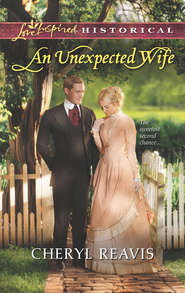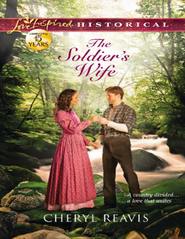По всем вопросам обращайтесь на: info@litportal.ru
(©) 2003-2024.
✖
The Bride Fair
Настройки чтения
Размер шрифта
Высота строк
Поля
“Rob was twenty-eight. Samuel was sixteen.”
“Where were they killed?”
“Gettysburg,” she said, holding his gaze. She didn’t understand why he was asking her this—when it was obvious to her that he already knew.
“I was at Gettysburg,” he said.
She looked away, still not understanding. There was no malice in his voice and no apology or sympathy, either. It was merely a quiet statement of fact—and she could make of it whatever she would.
“Your fiancé,” he continued after a moment.
“I don’t talk about him,” she said. “Ever.” It was all she could do to remain seated.
“Then you can tell me what I asked you earlier—before you fled the room. Do Major Howe and his wife live nearby?”
“Major Howe is no longer here. I believe he’s returned to Washington.”
“Alone?”
She looked at him. “With his wife and mother-in-law, Mrs. Verillia Douglas,” she said.
“Ah, yes. Verillia. I would have liked to have been introduced to Verillia. According to Major Howe, she is quite the physician in her own right, is that not so?”
“She has helped my father on many occasions. I wish she were…”
Maria trailed off. She was barely acquainted with the Howes, but she knew Verillia Douglas well. And it wasn’t just for her father that she wished Verillia’s return, or even Suzanne. Verillia was the one woman in this town to whom she might speak of her current predicament. Verillia wouldn’t condemn her—she would help her, even if it were nothing more than to allow her a shoulder to weep on.
She realized suddenly that the colonel had said something.
“I beg your pardon?”
“I asked why Major Howe and his family left.”
“I understand there was some concern on his part about the fires—and that he had a disagreement with Colonel Hatcher. My father will know the details. I’m certain he will give them to you if you ask him.”
“Perhaps I will. Tell me, how do the people here view Major Howe’s marriage to a local girl?”
“I don’t know,” she said.
“Then how do you view it?”
“I have no opinion.”
“Because you only know them by sight.”
“Because I have no opinion,” she said evenly.
“It was a love match,” he said.
“So I’ve heard.”
“Major Howe tells me he would be dead twice over but for his wife. Apparently, it was the man that mattered to her and not his politics. All in all, a very romantic story, don’t you think?”
Maria made no comment. She was far too busy trying to fathom his intent.
It suddenly came to her. He wanted to point out to her, however subtly, that the people here—the women here—had been vanquished in more ways than one. Perhaps Major Howe’s marriage to Amanda Douglas had been a love match—but the ones she was witnessing now weren’t. They couldn’t be more mercenary, and she longed to tell him so.
She glanced at him; he was staring at her across the table.
“Feeling better?” he asked quietly.
“I feel quite fine,” she answered.
“And your friend? Your particular friend—Suzanne. How is she?”
“How did you—”
She broke off. Of course. He had been listening at the upstairs window. The question now was how much he had heard and what he would do about it.
“I assume she is not well,” he continued. “If her husband would chance being arrested to come here—on her behalf. Is that not so?”
Maria ignored the question and asked one of her own.
“How long will the curfew be in effect?”
“The curfew doesn’t apply to you—if you need to see about your friend. I will write you a pass.”
“Why?” Maria asked pointedly.
He held up his bruised hands. “I owe you a favor.”
“I believe that was canceled out with the lemon.”
“Perhaps. But you see, I want you in my debt, Miss Markham, rather than the other way around. I believe our association will go more smoothly if you are. I think you honor your debts. I think such things matter to you.”
She didn’t know whether to be insulted or flattered.
Yes, she did. Without a word, she abruptly stood and walked out of the room, all the while expecting him to object to her leaving.
But he didn’t say anything, and she didn’t stop until she reached the kitchen. She kept pacing around the room, trying to collect her thoughts. Then, she sat down at the worktable, only to get up again. She did not understand this man. Why would he extend to her what anyone would call a kindness—and then go out of his way to make sure she didn’t mistake it for that? Were they both to keep some kind of running tally of favors paid and favors owed?
She gave an exasperated sigh. He had offered to help her. The offer itself—and the reason for it—had been plainly stated. But it was what he did not say that she found so vexing. He could and would help her—and the only impediment would be that her animosity for him and his kind was more important to her than her “particular friend,” Suzanne.
She could hear a commotion at the front of the house: men—soldiers—coming in from the outside.
Officers.
She could tell by the banter. It was the same game of Who’s The Better Man? that the enlisted men engaged in everywhere one went, except that theirs, while no less biting, was more sophisticated and subtle.











